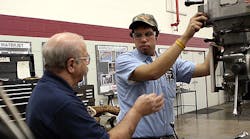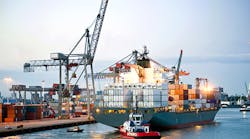Editor
I regularly re-read my past writing to ensure I’m not repeating myself, to learn how my thinking has changed, and to know where I might have been wrong. It’s an effort to keep myself clear, and honest, but it’s also a nod to the notion that none of us is especially good at apprehending all that goes on around us. I’m frequently off-target or off-key, or just mistaken. The great weakness of humans is to act as though we understand and can shape events.
Recently, I reviewed something I wrote in September 2007, just after the Federal Reserve Board cut interest rates. That move drove up the value of U.S. equities but effectively it let the value of the U.S. dollar decline. It was an inflationary tactic that the Fed resorted to in order to address an onerous trade deficit — and it pursued that tactic with even greater determination in the following years, to keep equity markets fluid — all the time maintaining that it was helping the U.S. remain globally competitive. The consensus opinion in 2007 was that the interest-rate cut would be a positive move, ultimately, because it would make domestic manufacturers more viable exporters. Exports, the consensus agreed, would drive U.S. economic growth.
I accepted the consensus then, though I objected to the appearance of retreat. But the fact that I was mistaken is not as instructive now as the realization that the plan was wrong, and continues to be wrong up to this day: U.S. stocks have recovered thanks to inflation, and exports have increased for many companies, but their success internationally makes them unwilling or unable to expand in the high-cost domestic market. Meanwhile, the trade deficit persists, and individuals are poorer because nearly everything costs more. It’s convenient to point out how these decisions favor the economically privileged (Wall Street) and punish everyone else (Main Street), but what’s more telling is that they don’t promote economic growth. By trying to address a single problem — the trade deficit — the Federal Reserve made just about everything else worse, and yet the consensus assumptions about managing a global economy prevail.
The Fed is not alone in its dangerous ineffectiveness. The consensus in 2008 called for the U.S. Treasury to intervene to save several big banks and brokerages. The consensus in 2009 indicated a dire need for an emergency federal stimulus program to jump-start a staggering domestic economy. Lately there is an argument for an infrastructure bank, a “public-private partnership” where big government and big investors can coordinate plans that the free market won’t support.
The fixation on exports and infrastructure spending is the most confounding to me. Both are fine goals, but they are aimed at garnering a larger portion of an existing market — not at growing new revenue opportunities.
The slim thread of logic running through all this is the belief that those good intentions will “correct” threatening trends, or direct activity well enough to cause other investors to follow. Advocates of this view recall government spending during the 1930s, or point out the economic planning in China and elsewhere. Think what you may about such comparisons, they are simply irrelevant to the size and diversity of today’s U.S. economy.
They also mistake the trend of history. Everyone recognizes how the global economy challenges domestic businesses. Less widely understood is that the same forces shaping global economics are strengthening individuals with greater access to information, resources, and opportunity. This should be the time for us to grow, not “correct” the past or manage the present.
In its best periods, the U.S. economy has been dynamic and unpredictable. Bold entrepreneurs become wealthy, but simple hard work will achieve comfortable prosperity. This economy’s greatest resource is resourcefulness: encouraging individuals to use their best ideas and efforts for their own improvement creates an atmosphere of exponential growth.
Conversely, the crises over the past four years have driven the consensus to demand stability, and to accept the promises to make it so. There is no consensus, yet, for a return to the dynamism that is our strength, but if we’d move beyond the need for certainty we’d regain the confidence to demand it.










